#DC4CDE color HEX code RGB, HSL, CMYKCOLOR CODE FOR HEXA COLOR #DC4CDE |
|
#DC4CDE
|
In a RGB color space, hex #DC4CDE is composed of 86% red, 30% green and 87% blue. RGB color code is composed of a hexadecimal DC red (220/255), a 4C green (76/255) and a DE blue component (222/255). The decimal RGB color code is rgb(220,76,222) In CMYK color space, it is composed of 1% cyan, 66% magenta, 0% yellow and 13% black. It has a hue angle of 299.18o degrees, a saturation of 69% and a lightness of 58%. Closest websafe color is: #cc33cc rgb (204, 51, 204). |
|
|
|
#DC4CDE rgb(220,76,222) | = | 86% from 255 | 30% from 255 | 87% from 255 | = | 1 from 100 | 66 from 100 | 0 from 100 | 13 from 100 |
|
|
|
|
|
|
|
|
|||
| R: 220 red | G: 76 green | B: 222 blue | C: 1 cyan | M: 66 magenta | Y: 0 yellow | K: 13 black |
|||
| Hexa color | RGB color chart | CMYK color chart | |||||||
|
| Shade color variation |
| Tones of #DC4CDE |
| A tone is produced by adding gray to any pure hue. In this case, #D351D5 is the less saturated color, and #A16EA1 is the most saturated one. |
|
| Color of the text | Background color example |
|
Color of the text
|
Background color example
|
|
<font color="#DC4CDE;">Text here</font> |
<div style="background-color:#DC4CDE;">Text here</div> |
| Color preview on black background | Color preview on white background |
|
color preview on black background
|
color preview on white background
|
|
HTML code <div style="background-color:#000000"> <font color="#DC4CDE;">Text here</font> </div> |
HTML code <div style="background-color:#FFFFFF; border: 1px dotted #999999;"> <font color="#DC4CDE;">Text here</font> </div> |
| Div box shadow | Text shadow css code |
|
box shadow for color #DC4CDE
|
text shadow css code
|
|
HTML code <div style="background-color:#FFFFFF; box-shadow: 2px 2px 7px 1px #DC4CDE;"></div> .box-shadow: 2px 2px 7px 1px; |
CSS code .text-shadow: 1px 2px 2px #DC4CDE; |
| Box border html code | Text shadow with RGB values for color #DC4CDE |
|
box border html code for color #DC4CDE
|
text shadow with RGB values |
|
HTML code <div style="background-color:#FFFFFF; border:1px solid #DC4CDE;"></div> |
CSS code with RGB .text-shadow: 0px 2px 2px rgba(220, 76, 222, 1.4); |
| Pre-formatted code DC4CDE | code for script / programming |
| HTML, CSS: | = #DC4CDE; rgb(220, 76, 222) |
| Java: | = new Color(220, 76, 222) |
| .NET: | = Color.FromArgb (220, 76, 222); |
| Xojo: | = rgb (220, 76, 222, 0); |
| openGL: | = glColor3f (0.86f, 0.3f, 0.87f); |
| Swift: | = UIColor(red:0.86, green:0.3, blue:0.87, alpha:1.00000); |
| Objective-C: | = [UIColor colorWithRed:0.86 green:0.3 blue:0.87 alpha:1.00000]; |
Monochromatic color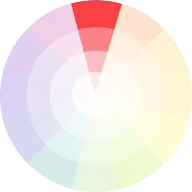 Monochromatic color schemes are easy to create because they use only one color. Monochromatic schemes use different tones from the same angle on the color wheel (the same angle).Just change color saturation +10% and you have a new monocromatic color. On our case color: 66% has a #DC4CDE saturation. Adding 66% + 10% = 76% saturation for our new color #B52CB8. Decreasing 66% - 10% = 56% saturation for other monochromatic color #FD70FF. |
Analogous color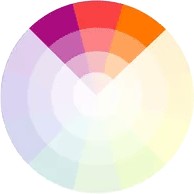 Analogous color schemes are created by using colors that are next to each other on the color wheel. Just +/- 30o on sides of the color hue angle. |
Complementary color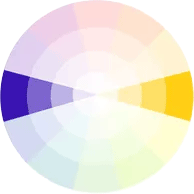
Complementary schemes are created by combining colors from opposite sides of the color wheel. Simple add 180 degrees to color hue / angle and you have the complementary color. On our case color: #DC4CDE has a 299o angle. Adding 299o + 180o = 119oo for our new complementary color #4EDE4B.
|
Split color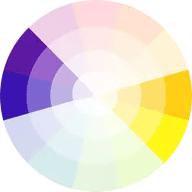 Compound schemes or split complementary schemens are almost the same as complementary schemes. Instead of using colors that are opposites, it uses colors on both sides of the opposite hue angle. On our case color: #DC4CDE has a 299o angle. Adding 299o + 180o+30o = 149o for our first complementary color #4BDE92. Decreasing 299o + 180o-30o = 89o for the second complementary color #97DE4B. |
Tiradic color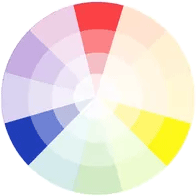 Triadic schemes are made up of hues/angles equally spaced around color wheel. Add and decrease +/- 120 degrees on both sides of the color hue angle. |
Tetradic color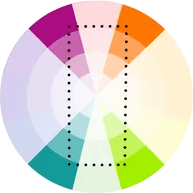 Tetradic schemes are made up of hues/angles spaced around color wheel. Add 120,180,300 degrees on the color hue angle. |
color | |
measurement units | |